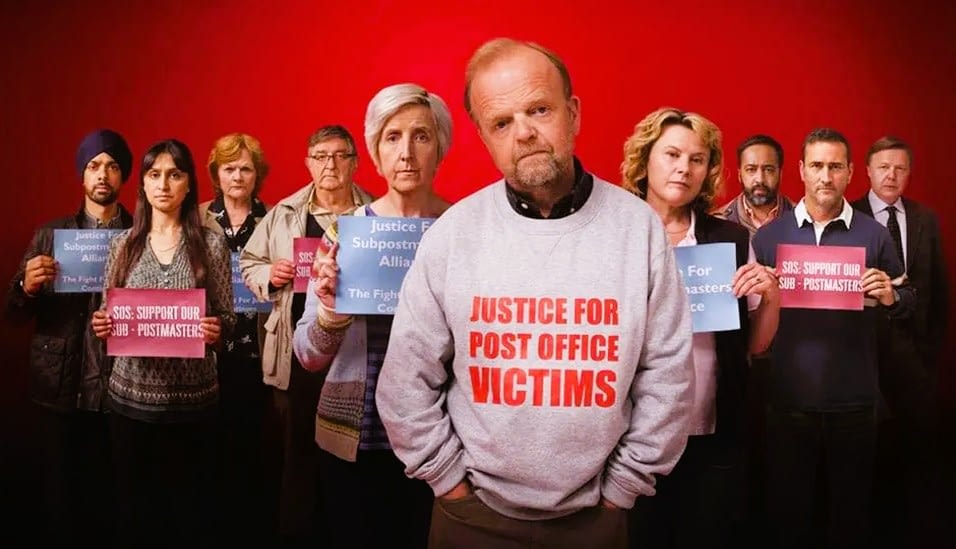The Drama of Mr Bates vs the Post Office
The ITV drama production ‘Mr Bates vs The Post Office‘ tells the true story of the Post Office Horizon computer system scandal spanning more than 20 years to the present day. This is commonly described as one of the ‘biggest miscarriages of justice in British legal history’ and saw hundreds of subpostmasters wrongly accused of theft, fraud, and false accounting due to a defective IT system operated by Fujitsu.
Such is the potency of storytelling that the recent broadcasting of the television drama led to over 1 million people signing a petition demanding that the former Post Office CEO, Paula Vennells, be stripped of her CBE. Ms Vennells subsequently handed back her CBE “with immediate effect”. Prime Minister Rishi Sunak said the government is looking at the option of exonerating all postmasters involved in the scandal. The ramifications continue at every level and span successive governements. Of course, as an onlooker it is easy to judge others, particularly with the benefit of hindsight. But the real events and the ITV drama production point to a question that can be put before anyone: ‘What do we do when systems fail?‘
Costly Grace vs Cheap Grace
We may find it difficult to comprehend institutional injustice, as it is often complex and multilayered. Individuals can be caught up within the complexity by simply ‘doing their job’. It then becomes even more difficult to distinguish those truly at fault. Sadly, the institutions of the Christian Church have also been found to be all too human when system failures are revealed. In a recent article in the Church Times when commenting on the Post Office scandal and the lessons that can be learned by the Church of England, Rev Canon Angela Tilby, said :
“The Church of England should take note, because we have seen the way in which it has prioritised reputation management over the needs of abuse victims, and top-down management over parish mission. Its mindset, corporately, is perhaps closer to the Post Office’s than the New Testament’s.“
Those who profess faith may have difficult choices to make when systems fail. As a parish priest for many years I have met and ministered to a few exceptional Christians who felt in all conscience that the only option they had left when faced with such dilmmas through their work was to become a ‘whistleblower’. In each case it took great courage and conviction and in each case it cost them dearly. From their example, I have learned that all too often faith can be treated like a buffet, taking as much of what we like, but leaving behind what’s too hard to swallow. A popular phrase that comes to my mind is, “The only thing necessary for the triumph of evil is for good people to do nothing.” (John Stuart Mill 1867). This captures the dilemma we can find ourselves in when systems and institutions fail. The German Theologian, Dietrich Bonhoeffer, executed in April 1945 for opposing the Nazis in Germany, described such a dilemma in Christian terms of ‘Costly Grace’ and ‘Cheap Grace’ in his classic book, The Cost of Discipleship:
“Such grace is costly because it calls us to follow, and it is grace because it calls us to follow Jesus Christ. It is costly because it costs a person their life, and it is grace because it gives a person the only true life. It is costly because it condemns sin, and grace because it justifies the sinner. Above all, it is costly because it cost God the life of his Son …and what has cost God much cannot be cheap for us.”
These words may feel a long way from our prevailing culture, which can often seem remarkably superficial and narcissistic. Cosmetic plastic surgeries. Fad health diets. Physical fitness regimes. Vitamins and drugs for vitality and stamina. Glorification of images of youthful beauty, rather than embracing the reality that we are an ageing population. Even most Christians don’t really want to consider the cost of discipleship in the way that Bonhoeffer describes. What’s behind that dark door is unknown, a mysterium tremendum, a sense of something mysterious, overwhelming, and daunting which elicits from us a sense of diminution, humility, submission, and creatureliness. Or to use the words of T.S. Eliot’s ‘Little Gidding‘, “…costing not less than everything.”
In three of the Gospels (Matthew 16:15, Mark 8:27, Luke 9:20), Jesus asks his followers a timeless question, “Who do you say that I am?” The response of any follower will define us in everything. But often we live fragmented and compartmentalized lives. Subsequently, the tension that comes with these different lives can lead our behaviour to become contradictory, even hypocritical. What Bonhoeffer might describe for people of faith as “cheap grace.” In a review of Bonhoeffer’s classic book, Dr. Richard Blackaby summarises this as follows:
Bonhoeffer’s chief attack is against what he refers to as “cheap grace.” He argues that “Cheap grace is the deadly enemy of our Church. We are fighting today for costly grace.” He adds, “Cheap grace means grace as doctrine, a principle, a system. Cheap grace is the preaching of forgiveness without requiring repentance, baptism without church discipline, communion without confession. Cheap grace is grace without discipleship, grace without the cross, grace without Jesus Christ, living and incarnate”

Through You I Can
Like the first disciples, we may think we have a good idea of what being a person of faith and following Jesus looks like. But it can easily be shaped by the values of this world, not the values of God’s Kingdom. Our limited view can prevent us from seeing the bigger picture of God’s grace extended to all people, not just the ones we like. And we don’t always see how our actions and words, based on that limited view, impact others. We can’t see the hurt we cause, or the doors we close. We can’t see how not bearing our cross, makes another’s cross heavier.
The paradox of the message of Jesus is that in full surrender, we will find complete freedom. A paradox is that place where two ideas that seem to contradict each other are held in tension, balancing one another. Following the Way of Jesus can often be such a paradox. But the personal and cultural pressure to always put ourselves first will not ultimately satisfy our hunger for meaning. Or, what I would more accurately describe in biblical terms as ‘Shalom.’ And deep down, we know we aren’t enough. Rev Dr Clayton Schmidt, an American Christian author and Provost of the Lutheran Theological Southern Seminary of Lenoir-Rhyne University of Columbia, South Carolina, puts it like this:
“The problem is we are pretty poor at cross bearing … even to deny ourselves seems too much to ask. … Here is both the challenge and the good news: If we follow Jesus, we will be called to bear certain crosses and lose hold of our lifestyle, if not our life. Yet, in all our weakness and human mindedness, it is Jesus’ own death on the cross that enables us to do what we cannot.… It is his burden we take upon our shoulders. It is his strength that bears the weight. We do nothing on our own, but he can do much through us. Without him, Peter was no Rock, but a stumbling block. With him, Peter was the Church. We say, ‘But, Lord, I cannot.’ And God says, ‘I’m glad to hear you say that. Because through you, I can.’”
The complexities of life may lead us at any time to make decisions, or fail to make decisions, that with the benefit of hindsight we may regret. That is the frailty of our human nature. The one thing we can all learn from the Post Office Horizon scandal is that we each have a moral responsibility to see, ‘the bigger picture’. Not to remain deliberately blinkered. But instead to develop a lifelong habit of cultivating our conscience. To see ourselves as more than individual components in a system which we do not wish to be held accountable for. Speaking ‘truth to power’ may sometimes lead to a cost which will need to be carefully considered, which is equally true for people of faith. It will require each of us to question what we ultimately value. And if what we value requires strength to hold onto, then maybe in part, we can find encouragement from these few words: “Through you I can.”


